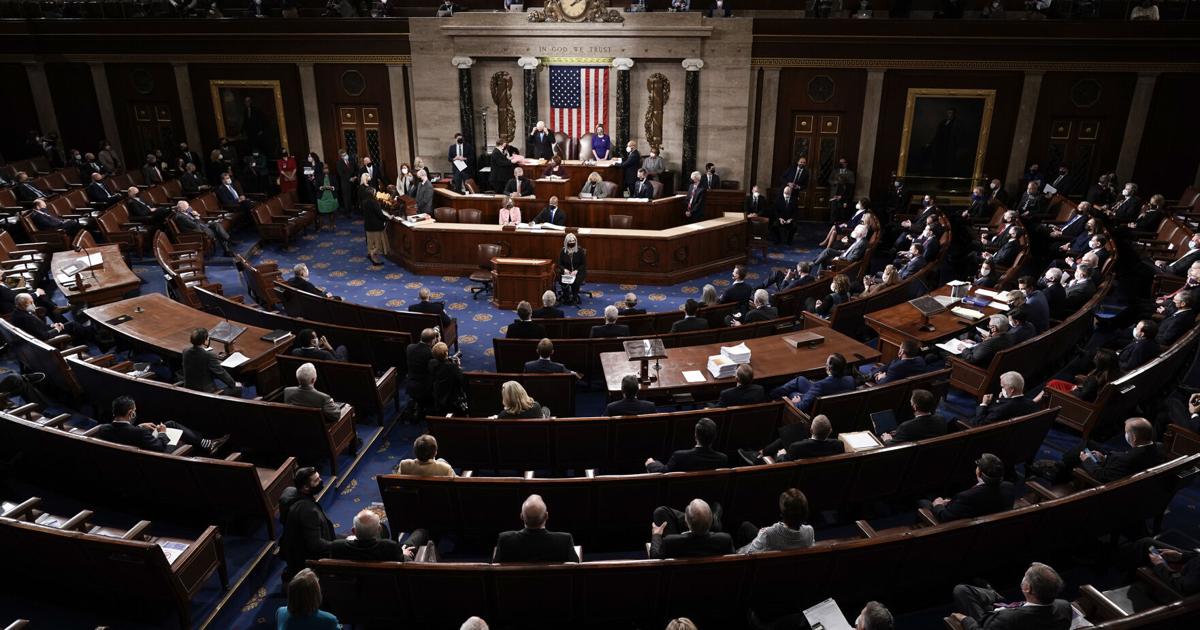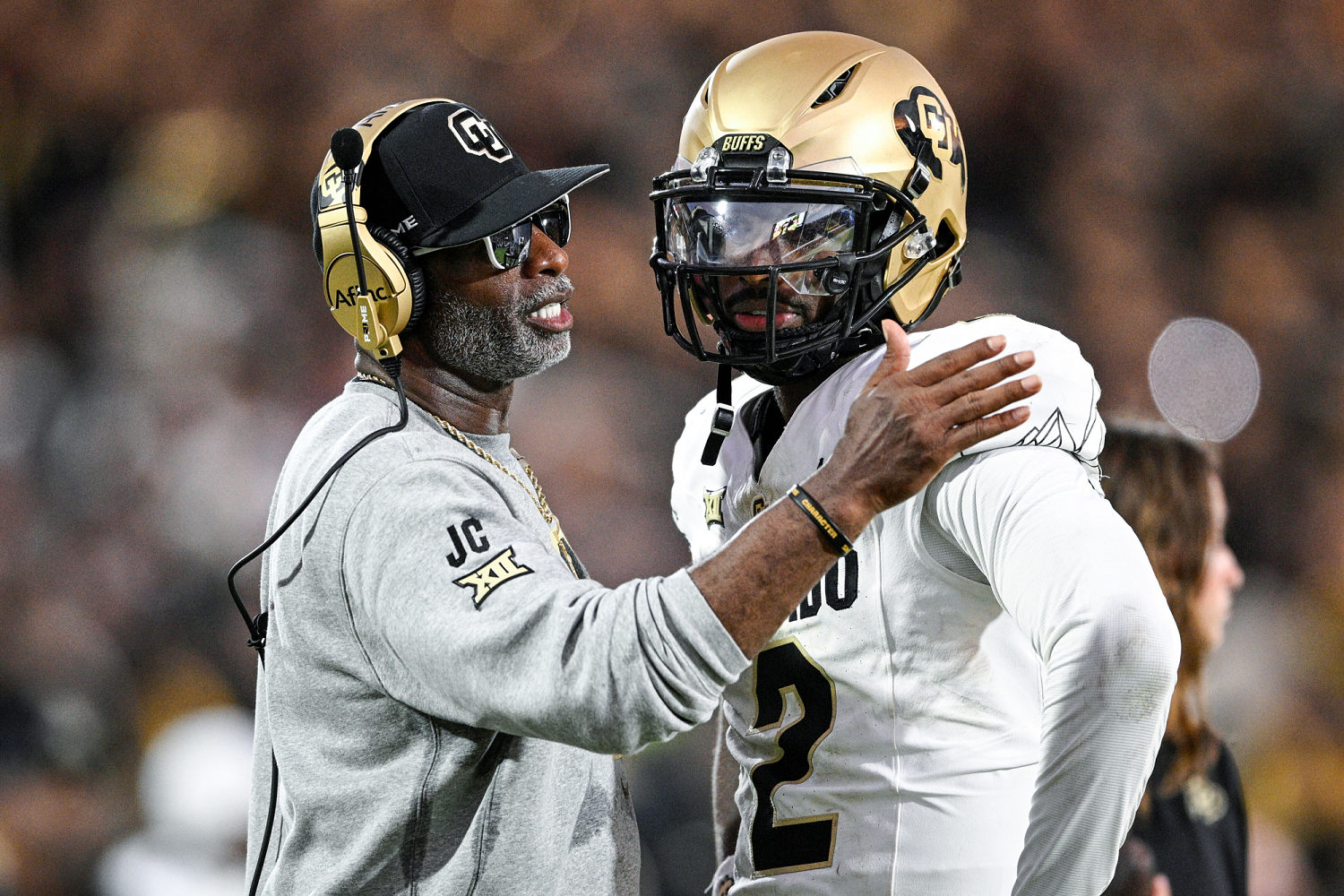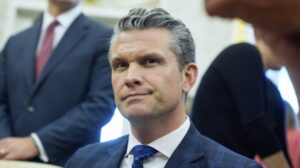The Dictatorship
Congress is ready to certify Trump’s election win, but his Jan. 6 legacy hangs over the day

WASHINGTON (AP) — Congress certified President-elect Donald Trump as the winner of the 2024 election in proceedings Monday that unfolded without challenge, in stark contrast to the Jan. 6, 2021, violence as his mob of supporters stormed the U.S. Capitol.
Lawmakers convened under heavy security and a winter snowstorm to meet the date required by law to certify the election. Layers of tall black fences flanked the Capitol complex in a stark reminder of what happened four years agowhen a defeated Trump sent rallygoers to “fight like hell” in what became the most gruesome attack on the seat of American democracy in 200 years.
The whole process this time concluded swiftly and without unrest. One by one, a tally of the electoral votes from each state was read aloud to polite applause in the House, no one objected and the results were certified.
“Today, America’s democracy stood,” Vice President Kamala Harris, a Democrat, said after presiding over the session — as is the role of her office — and her own defeat to Trump.
But Trump’s legacy from 2021 leaves an extraordinary fact: The candidate who tried to overturn the previous election won this time and is legitimately returning to the White House, his inauguration in two weeks.
While Monday’s outcome revived a U.S. tradition that launches the peaceful transfer of presidential power, what’s unclear is if Jan. 6, 2021, was the anomaly or if this year’s calm becomes the outlier.
Trump denies that he lost four years ago, muses about staying beyond the Constitution’s two-term White House limit and promises to pardon some of the more than 1,250 people who have pleaded guilty or were convicted of crimes for the Capitol siege. He calls Jan. 6, 2021, a “day of love.”
Trump said online Monday that Congress was certifying a “GREAT” election victory and called it “A BIG MOMENT IN HISTORY.”
Still, American democracy has proven to be resilient, and Congress, the branch of government closest to the people, came together to affirm the choice of Americans.
With pomp and tradition, the day unfolded as it has countless times before, with the arrival of ceremonial mahogany boxes filled with the electoral certificates from the states — boxes that staff were frantically grabbing and protecting when Trump’s mob stormed the building last time.
Senators walked across the Capitol — which four years ago had filled with roaming rioters, some defecating and menacingly calling out for leaders, others engaging in hand-to-hand combat with police — to the House to begin certifying the vote.
The House chaplain, Margaret Kibben, who delivered a prayer during the violence four years ago, made a simple request as the chamber opened to “shine your light in the darkness.”
Harris stood at the dais where then-Speaker Nancy Pelosi was abruptly rushed to safety last time as the mob closed in and lawmakers fumbled to put on gas masks and flee, and shots rang out as police killed Ashley Babbitta Trump supporter trying to climb through a broken glass door toward the chamber.
And Harris certified her own defeat — much the way Democrat Al Gore did in 2001, Republican Richard Nixon did in 1961 and then-Vice President Mike Pence did four years ago.
When Harris read the tally, the chamber broke into applause: first Republicans for Trump’s 312 electoral votes, then Democrats for Harris’ 226.
Vice President-elect JD Vance had joined his former Senate colleagues in the front row, and was surrounded afterward with congratulatory handshakes, hugs and photos.
Congress certified President-elect Donald Trump as the winner of the 2024 election in proceedings that unfolded without challenge, in stark contrast to Jan. 6, 2021. Vice President Kamala Harris read the tally, including of her own defeat.
Within half an hour the process was done.
There are new procedural rules in place after what happened four years ago, when Republicans echoed Trump’s lie that the election was fraudulent and challenged the results their own states had certified.
Under changes to the Electoral Count Actit now requires one-fifth of lawmakers, instead of just one in each chamber, to raise any objections to election results.
But none of that was necessary.
Republicans who challenged the 2020 election results now express greater trust in U.S. elections after Trump defeatedHarris.
Rep. Andy Biggs, R-Ariz., who led the House floor challenge in 2021, said people at the time were so astonished by the election’s outcome and there were “lots of claims and allegations.”
This time, he said: “I think the win was so decisive. … It stifled most of that.”
And Democrats frustrated by Trump’s victory nevertheless accepted the choice of the American voters, with House Democratic Leader Hakeem Jeffries saying his side of the aisle is not “infested” with election deniers.
“There are no election deniers on our side of the aisle,” Jeffries said last week on the first day of the new Congress, to applause from Democrats in the chamber.
Harris said afterward that Jan. 6 this time was “about what should be the norm and what the American people should be able to take for granted, which is one of the most important pillars of our democracy: the peaceful transfer of power.”
Last time, far-right militias helped lead the mob to break into the Capitol in a war zone-like scene. Officers have described being crushed and pepper-sprayed and beaten with Trump flag poles, “slipping in other people’s blood.”
Leaders of the Oath Keepers and Proud Boys have been convicted of seditious conspiracy and sentenced to lengthy prison terms. Many others faced prison, probation, home confinement or other penalties.
Pence, who had been rushed into hiding that day as rioters threatened to hang him for his refusal to reject Biden’s win, wrote online that he welcomed what he called “the return of order and civility” to the certification process.
Trump was impeached by the House on the charge of inciting an insurrection that day but was acquitted by the Senate. At the time, GOP leader Mitch McConnell blamed Trump for the siege but said his culpability was for the courts to decide.
Federal prosecutors subsequently issued a four-count indictment of Trump for working to overturn the election, but special counsel Jack Smith withdrew the case last month after Trump won reelection, adhering to Justice Department guidelines that sitting presidents cannot be prosecuted.
Biden, in one of his outgoing acts, awarded the Presidential Citizens Medal to Rep. Bennie Thompson, D-Miss., and former Rep. Liz Cheney, R-Wyo., who had been the chair and vice chair of the congressional committee that conducted an investigation into Jan. 6, 2021.
Trump has said those who worked on the Jan. 6 committee should be locked up.
___
Associated Press writers Fatima Hussein and Ashraf Khalil contributed to this report.
The Dictatorship
Trump administration asks Supreme Court for permission to enforce transgender military ban

The Trump administration wants the Supreme Court to let it enforce a ban on transgender people serving in the military, after a federal trial judge preliminarily blocked the ban nationwide pending further litigation.
Last month, U.S. District Judge Benjamin Settle said transgender service members who sued over the ban raised “serious questions going to their Equal Protection, Due Process, and First Amendment rights.” The George W. Bush appointee sitting in Washington state also said that “the balance of hardships tips sharply towards plaintiffs, who suffer not only loss of employment, income, and reputation, but also a career dedicated to military service.”
On Thursday, the administration again turned to the high court, as it has done several times over the past few months after losing lower court litigation.
The Supreme Court has so far agreed with the administration in some but not all cases.
“In this case, the district court issued a universal injunction usurping the Executive Branch’s authority to determine who may serve in the Nation’s armed forces,” U.S. Solicitor General John Sauer wrote, sounding a familiar theme of judges unduly meddling with executive power. The Supreme Court has so far agreed with the administration in some but not all cases.
Sauer said that if Settle’s nationwide halt isn’t paused while the government appeals, that would be “a period far too long for the military to be forced to maintain a policy that it has determined, in its professional judgment, to be contrary to military readiness and the Nation’s interests.” He asked the justices to at least limit the injunction to the individual plaintiffs while litigation continues.
An appellate panel of the U.S. Court of Appeals for the 9th Circuit declined last week to halt Settle’s ruling, and Sauer’s Supreme Court application followed. It went to Justice Elena Kaganwho handles emergency litigation from the 9th Circuit (the justices handle different circuits). She told the plaintiffs to file a written response by next Thursday, May 1, at 5 p.m. ET, after which the government can file a final reply brief and Kagan can refer the matter to the full court for consideration. But the ban is still blocked for now.
Subscribe to theDeadline: Legal Newsletterfor expert analysis on the top legal stories of the week, including updates from the Supreme Court and developments in the Trump administration’s legal cases.
Jordan Rubin is the Deadline: Legal Blog writer. He was a prosecutor for the New York County District Attorney’s Office in Manhattan and is the author of “Bizarro,” a book about the secret war on synthetic drugs. Before he joined BLN, he was a legal reporter for Bloomberg Law.
The Dictatorship
Shedeur Sanders is a nepo baby. That’s his blessing and his curse.

Many football fans will be shocked if University of Colorado quarterback Shedeur Sanders isn’t among the first names called in Thursday night’s NFL draft. Sanders, a four-year starter — he played his first two seasons at Jackson State University — is a top prospect in a draft class that NFL scouts generally view as short on franchise quarterback talent. There are at least five quarterback-starved teams picking in the top 10, and so, their thinking goes, it should be an early night for Sanders.
Doubts abound. Various NFL coaches and league executives — they’re always anonymous — have derided Sanders since the NFL combine.
Yet doubts abound. Various NFL coaches and league executives — they’re always anonymous — have derided Sanders since the NFL combine, foreshadowing a possible slide to later in the first round, if not after. Those doubts aren’t completely meritless. The defenses in Jackson State’s Southwestern Athletic Conference weren’t teeming with NFL-level talent. Colorado rejoined the Big 12 in 2024, but the team played only one ranked opponent all year. Sanders also declined to throw at the NFL combinewhich no doubt bothered some coaches and scouts. However, he did throw later at Colorado’s pro day.
While there are valid on-field reasons to debate whether a team should stake its future on Shedeur Sanders’ arm, today’s a good day for transparency about what inspires the majority of the debate: worries about how big a role his famous father, Deion (aka “Prime Time,” aka “Coach Prime”) Sanderswill seek to have in his son’s professional football career.
Shedeur Sanders is a classic nepo babydespite the “he got it out of the mud” narrative that his fans and his father’s fans like to spread. To say that Sanders has benefited from nepotism isn’t to insult the player or to stand with his critics whose animus toward him is less about his abilities and more about his father. Instead it’s an attempt to view the player with clarity and be honest about the reasons so much more time and attention, at least in sports media, are being devoted to him than on any other player in this year’s draft.
It’s true that Sanders is being considered for the NFL draft because of his talent and hard work. He compiled a 70.1% completion percentage with 134 passing touchdowns and only 27 interceptions in college. He’s what most football coaches want: an efficient passer who minimizes turnovers; in short, he earned his way to the NFL draft with his play.
But it’s also true that he owes much of his success to being the son of a Pro Football Hall of Famer who is one of the most braggadocious athletes to ever stride the planet. Deion Sanders, who’d never coached on the collegiate level, nonetheless had the clout to cut deals that made him his son’s head football coach at two NCAA Division I programs and the personality to do so unapologetically.
Deion Sanders, who’d never coached on the collegiate level, cut deals that made him his son’s head football coach at two NCAA Division I programs.
I’ve talked to fans who point out that University of Texas quarterback Arch Manning is projected as a top pick in next year’s draft, no doubt owed in part to the fact that his uncles, Peyton and Eli Manning, won four Super Bowls between them as quarterbacks and his grandfather, Archie Manning, played quarterback for the New Orleans Saints. But the comparison between the youngest Manning and the young Sanders ends at famous relatives. Whatever the elder Mannings have done to manage Arch’s climb has been done behind the scenes. To watch Shedeur’s college career was to also watch his dad’s second act as a coach and social media personality and to hear him call you a hater if you didn’t like what you saw.
He’s not wrong that many fans, and no doubt some coaches and league officials, don’t like the Sanders’ default in-your-face posture. If flashing an expensive watch at the opposing sideline in game, then posting a YouTube video about why you did it is an example of Shedeur mimicking his father’s cockiness, it’s also a, uh, prime example of a brand of puffery that some segments of America have always been uncomfortable with in accomplished Black men. Shedeur himself has even called that out, telling NBC Sports that he’s been mentored by former Black quarterbacks who understand what he’s been through.
If Sanders falls in the draft, it could be partly because some teams fear the idea of drafting him and then having to contend with public criticism from his dad if they make decisions “Coach Prime” doesn’t like. It’d be an awful reason for a talented player to have his draft stock tumble, but bad things have happened in the NFL draft for even less valid reasons. For his own part, Shedeur Sanders seems unmoved by it all. Asked in a recent interview about the prospect of not being taken first overall, he shrugged.
“Why would I be mad?” he asked. “You gotta understand, I think about it like this: These are good problems to have. You could be in a way worse situation.”
If Shedeur Sanders falls in the draft, it could be because teams fear drafting him and then having to contend with public criticism from his dad.
That’s a good outlook to have for somebody under the spotlight he’s under. However much Sanders owes his success to having a powerful parent, what he’s really owed from the outset is to be treated like any other prospect in this year’s draft. The best, yet most improbable, outcome is that he’s drafted high, then totally insulated from his father’s shadow and whatever projection coaches and fans might direct from elder onto junior. What Sanders deserves is the opportunity to succeed or fail on his own.
But nothing we’ve seen so far — from Shedeur Sanders, Deion Sanders, NFL teams or fans — suggests that is likely to happen.
Keith Reed is an award-winning journalist and a past senior editor at ESPN. His work has appeared in The Boston Globe, The Root, Vibe, Essence and elsewhere.
The Dictatorship
‘A devastating blow’: Trump guts funding for U.S.’s largest health study of women

This is an adapted excerpt from the April 23 episode of “All In with Chris Hayes.”
As Donald Trump and Elon Musk continue to gut all kinds of key federal programswe are once again asking: Who voted for this? This week’s example: the Women’s Health Initiative.
The National Institutes of Health began the initiative back in 1991. The project started under the leadership of Bernadine Healy, a practicing cardiologist and legendary figure in public health. She was appointed by then-President George H.W. Bush to be the first woman to run the NIH. Healy called the initiative — the largest women’s health prevention study in the U.S. — a “moon walk” for women.
The purpose of the long-term project was to research cancer, heart disease and osteoporosis in postmenopausal women, a group that had been historically neglected by disease prevention researchers.
Healy called the initiative —the largest women’s health prevention study in the U.S. — a “moon walk” for women.
The initiative is possibly best known for its study of the potential risks of estrogen-plus-progestin hormone therapy to treat the symptoms of menopause. The Women’s Health Initiative estimates that research prevented 126,000 cases of breast cancer and 76,000 cases of heart disease over the following decade. Which, in turn, saved more than $35 billion in direct medical costs.
The initiative produces important research to this day. For example, just last May, it released a study finding that calcium-plus-vitamin D supplements do not prevent bone fractures in menopausal women.
But this week, the Women’s Health Initiative announced that the Trump administration is cutting its funding. Its regional research centers will close in September. The main research center’s future also remains uncertain after January of next year. The funding, in totality, amounts to a mere $10 million annually. (And $10 million is less than half of what U.S. taxpayers have reportedly spent for Trump’s golf tripsin these first three months of his term.)
No study is a better example of the enormous scientific impact of research on the prevention of chronic disease in the population.
Dr.JoAnn Manson
JoAnn Manson, a doctor with Harvard Medical School, told Science that the cuts are a “devastating blow to the health of all older adults in the U.S. and throughout the world.” She added, “No study is a better example of the enormous scientific impact of research on the prevention of chronic disease in the population.” Chronic disease prevention — that is the point of this research. It’s not a partisan issue.
So, the question still stands: Who voted for this? Because I sure don’t remember Trump’s campaign promise to cut breast cancer research and to make menopause harder for American women.

Chris Hayes hosts “All In with Chris Hayes”at 8 p.m. ET Tuesday through Friday on BLN. He is the editor-at-large at The Nation. A former fellow at Harvard University’s Edmond J. Safra Foundation Center for Ethics, Hayes was a Bernard Schwartz Fellow at the New America Foundation. His latest book is “The Sirens’ Call: How Attention Became the World’s Most Endangered Resource” (Penguin Press).
Allison Detzel
contributed
.
-

 The Josh Fourrier Show6 months ago
The Josh Fourrier Show6 months agoDOOMSDAY: Trump won, now what?
-
Uncategorized5 months ago
Bob Good to step down as Freedom Caucus chair this week
-

 Politics6 months ago
Politics6 months agoHow Republicans could foil Harris’ Supreme Court plans if she’s elected
-

 Politics5 months ago
Politics5 months agoWhat 7 political experts will be watching at Tuesday’s debate
-
Economy6 months ago
Fed moves to protect weakening job market with bold rate cut
-
Uncategorized5 months ago
Johnson plans to bring House GOP short-term spending measure to House floor Wednesday
-

 Politics5 months ago
Politics5 months agoRFK Jr.’s bid to take himself off swing state ballots may scramble mail-in voting
-
Economy6 months ago
It’s still the economy: What TV ads tell us about each campaign’s closing message









